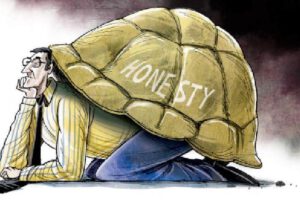
Welfare of people in right direction is impossible if dishonest and selfish advisors occupy the high position. They are basically curse on the system.
V S Pandey
Good, honest, benevolent and just governance is the dream every society has been striving for and aspiring for thousands of years. There have been very few rulers across the globe who find mention in history books for their virtuous governance. This is the tragedy of our civilisation also – we have had only one Vikramaditya to name. The rest are known for their victories, vast empires, long reigns, building monuments, etc. Good Governance is not a rocket science, but almost every ruler fails to provide it to the people. It seems that a few basic characteristics like integrity, just action, courage, benevolence are always found missing in the ruling dispensation here or anywhere across the globe. The lessons of history are clear – rulers with unjust, dishonest, deceitful mindsets will tend to surround themselves with selfish ,cowardly, self-serving, boot lickers and dishonest advisers who bring down governance to abysmal levels.
Almost every government, in the name of improving governance and making it effective, efficient, people oriented and corruption free, changes policies, brings about administrative changes every now and then, but with no effect. Government machinery has remained as inefficient, corrupt and poor performing as ever.

In the year 1931 Bertrand Russell wrote an essay titled, “The Advantages of Cowardice” encapsulating the crux of the problem faced by society. He wrote, “during the French Revolution, when the Reign of Terror came to an end, it was found that no one was left alive among the politicians except prudent cowards who had changed their opinions quickly enough to keep their heads on their shoulders. The result was twenty years of military glory, because there was no one left among the politicians with sufficient courage to keep their generals in order. The French Revolution was an exceptional time, but wherever organisation exists cowardice will be found more advantageous than courage. Of the men at the head of businesses, schools, lunatic asylums, and the like, nine out of ten will prefer the supple lickspittle to the outspoken man of independent judgment. In politics it is necessary to profess the party programme and flatter the leaders; in the Navy it is necessary to profess antiquated views on naval strategy; in the army it is necessary to maintain a medieval outlook on everything; in journalism wage slaves have to use their brains to give expression to the opinions of millionaires; in education professors lose their jobs if they do not respect the prejudices of the illiterate. This result of the state of affairs is that in practically every walk of life the men who come to the top have served a long apprenticeship in cowardice, while the honest and courageous have to be sought for in workhouses and prisons. Is this regrettable?”

Doesn’t the scenario resonate? The art of succeeding has changed little since those times, despite the advent of democracy and unless this culture is changed for the better -no systemic reform of any kind is likely to succeed.
Any system which instead of encouraging people with courage, keeps rewarding those who have served a long apprenticeship in cowardice cannot expect to achieve any tangible result. If the system is in urgent need of reform -it is to bring about a profound change in the attitude of people occupying the higher positions to stop rewarding the cowards and the dishonest and start respecting those who for petty selfish interests do not compromise with the interest of the public and stand-up against, and strongly resist any illegal action of powers that be, howsoever important they may be.
It is the basic instinct of human nature to follow the path of least resistance and achieve maximum comfort for itself. Going against this basic instinct requires rigorous effort, duly supported and encouraged by the system. Such courageous human beings were always few and shall remain in a minority as despite encountering obstacles, they do not deviate and continue to move steadfast on the righteous path. Hence the first and foremost requirement of a system that wishes to bring about a change for the better and establish a society based on rule of law and equity has to adopt and inculcate the culture of respecting those who are not pliable and possess the spirit to act honestly with only the interest of society and nation foremost.
For those, who only have their self-interest uppermost in their mind, and whose ambition is to die in the odour of sanctity, respected by bank managers, admired by friends and neighbours, and universally regarded as models of what a citizen should be, Bertrand Russel’s advice is: ”don’t express your own opinions but those of your boss; don’t endeavour to realise ends which you yourself think good, but pursue rather those aimed at by some organisation supported by millionaires; in your private friendships select influential men if you can, or, failing that, men whom you judge likely to become influential. Do this, and you will win the good opinion of all the best elements in the community.
This is sound advice, but, for my part, I would sooner die than follow it.” The sooner our country and its political system learns to respect people with courage and integrity, the better it would be for our society and nation.
(Vijay Shankar Pandey is former Secretary Government of India)









